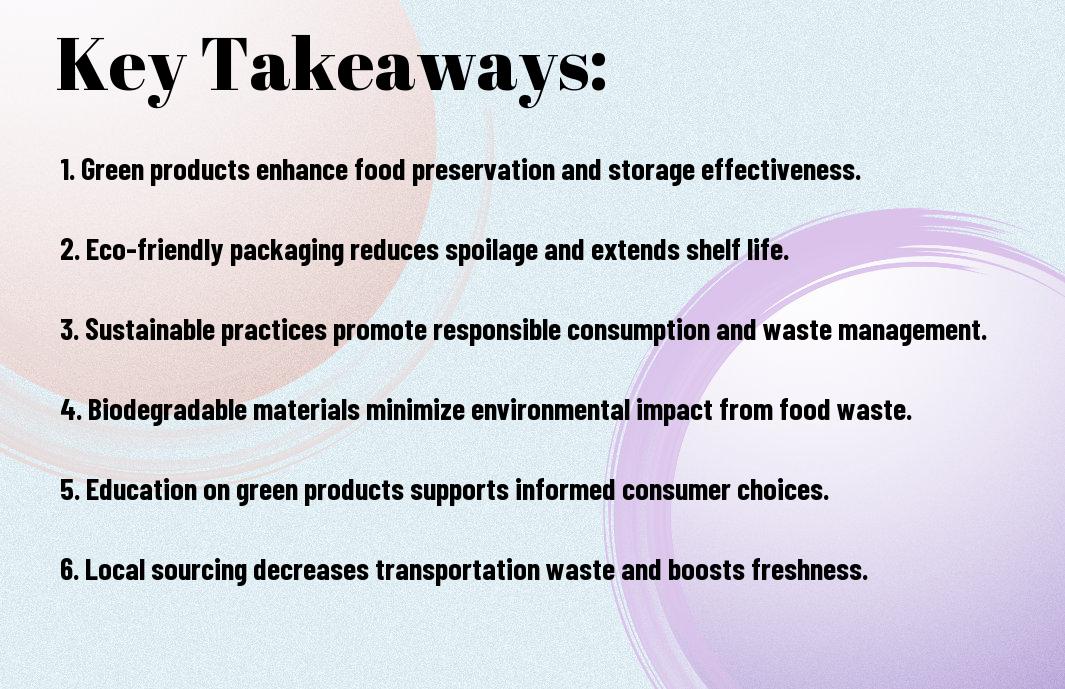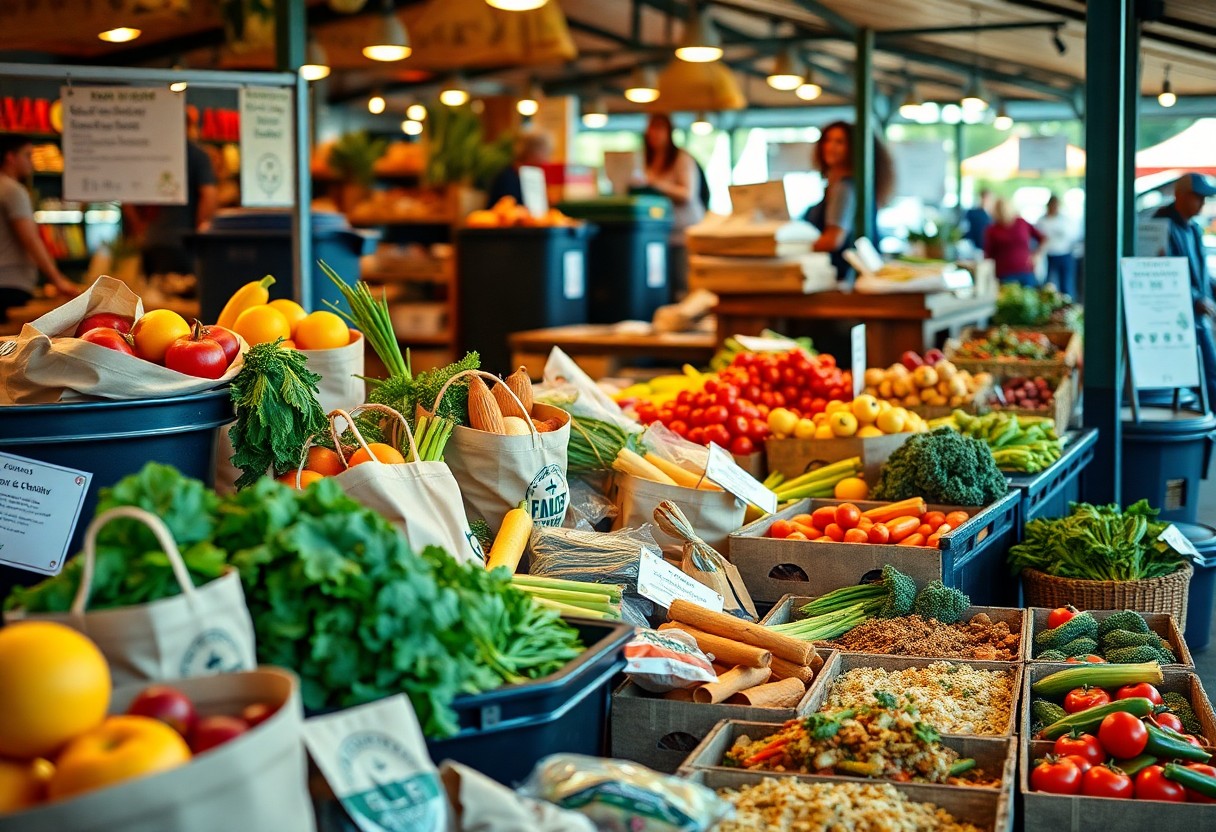As you consider the environmental implications of your daily choices, you may wonder how your shopping habits affect the planet. You likely know that food waste is a significant problem, and you’re looking for ways to reduce your contribution to it. Your decision to opt for green products can have a substantial impact on this issue, and by making informed choices, you can help minimize the staggering amounts of food that end up in landfills, ultimately reducing your carbon footprint and promoting a more sustainable future.
Key Takeaways:
- Using sustainable packaging can help reduce food waste by extending the shelf life of products and preventing damage during transportation and storage.
- Eco-friendly products, such as compostable or biodegradable packaging, can minimize the environmental impact of waste disposal and promote a circular economy.
- Implementing smart packaging solutions, like intelligent labels and tracking systems, can help monitor and manage food supply chains more efficiently, reducing food waste and improving logistics.
- Green products can also influence consumer behavior, encouraging people to adopt sustainable lifestyles and make environmentally conscious choices, which can lead to a reduction in food waste at the household level.
- Supporting local food systems and promoting seasonal produce can help reduce food waste by minimizing transportation distances, preserving food freshness, and encouraging consumers to buy locally sourced products.
Causes of Food Waste
Before you can tackle the issue of food waste, you need to understand what leads to it. The roots of food waste are complex, involving a combination of factors from production to consumption. As you explore this topic, you’ll find that waste occurs at various stages, including households and commercial settings.
Household Food Waste
Closely examining your own habits, you’ll see that factors like overbuying and poor meal planning contribute to waste in your own home. You might notice that you often discard expired or spoiled food, which could have been avoided with better planning and management.
Commercial Food Waste
Contrary to what you might expect, commercial waste is a significant part of the problem. You’ll find that supermarkets and restaurants discard a substantial amount of food due to appearance, overstocking, or expiring dates. This not only wastes resources but also impacts your environment.
Further investigation into commercial food waste will show you that the issue is deeply embedded in the supply chain. You’ll discover that strict quality standards, overproduction, and inefficient distribution networks all play a role in the staggering amounts of waste generated by commercial entities, affecting not just the environment but also your own wallet through higher food prices.

Benefits of Green Products
There’s no denying that green products have a significant impact on reducing food waste, and as you consider making the switch, you’ll find that the benefits are numerous. By choosing green products, you’re not only reducing your environmental footprint but also promoting a more sustainable food system.
Eco-Friendly Packaging
With the rise of eco-friendly packaging, you can now make a conscious choice to reduce waste. You’ll find that many green products utilize biodegradable or recyclable materials, allowing you to minimize your impact on the environment.
Sustainable Food Production
One of the most significant advantages of green products is their focus on sustainable food production. You’ll discover that sustainable farming practices prioritize soil health, biodiversity, and efficient water use, resulting in a more environmentally friendly food system.
Even as you research deeper into sustainable food production, you’ll notice that it’s not just about the environment – it’s also about the quality of the food you eat. By choosing green products, you’re supporting farmers who prioritize sustainable practices, and in turn, you’re getting fresher, healthier produce that’s better for you and the planet.
Impact of Green Products on Reducing Food Waste
To minimize your environmental footprint, consider the role of green products in reducing food waste. By adopting eco-friendly practices, you can significantly decrease the amount of waste generated in your daily life.
Reduction in Packaging Waste
Besides the obvious benefits of reducing food waste, green products also help decrease packaging waste. You can opt for products with minimal or biodegradable packaging, reducing your overall waste output.
Increased Food Shelf Life
Along with reducing waste, green products can also help extend the shelf life of your food. You can use reusable containers and bags to store food, keeping it fresh for a longer period.
Another advantage of using green products is that they often utilize natural preservatives and ingredients that help maintain the quality of your food. By choosing these products, you can enjoy your food for a longer time, reducing the likelihood of waste and saving you money in the long run.
Consumer Behavior and Green Products
Keep in mind that your purchasing decisions have a significant impact on the environment, and opting for green products can substantially reduce food waste. By choosing eco-friendly alternatives, you are supporting sustainable practices and promoting a healthier planet.
Awareness of Green Products
Toward a more sustainable future, you will find that awareness of green products is increasing, and many companies are now offering environmentally friendly options, allowing you to make informed choices that align with your values.
Changing Consumer Habits
Behind the shift towards green products lies a growing concern for the environment, and as you become more mindful of your consumption habits, you begin to make changes that have a positive impact on reducing food waste.
In addition to making conscious choices, you can also influence others by sharing your knowledge and experiences with green products, creating a ripple effect that can lead to a significant reduction in food waste and a more sustainable future for all.

Green Product Innovations
Unlike traditional products, green innovations offer a sustainable solution to reducing food waste, and you can make a significant impact by choosing eco-friendly alternatives, as you explore the various options available in the market, you will find that these products are designed to minimize waste and reduce environmental harm.
Biodegradable Packaging
One of the most significant developments in green product innovations is biodegradable packaging, which you can use to reduce your environmental footprint, by opting for packaging materials that can easily decompose, you are contributing to a more sustainable future, and this simple change can make a significant difference in reducing waste.
Food Waste Reduction Technologies
Reduction of food waste is a key benefit of green product innovations, and you can take advantage of technologies designed to help you reduce waste, such as smart storage containers and expiration date tracking systems, these tools enable you to manage your food supply more efficiently, and make informed decisions about your consumption habits.
Packaging plays a significant role in food waste reduction technologies, and as you consider your options, you will find that many companies are now using advanced materials and designs to create packaging that is not only biodegradable but also helps to preserve food for longer periods, this means that you can enjoy your food while also reducing waste, and by making informed choices, you can contribute to a more sustainable food system, and help to minimize the environmental impact of food production and consumption.
Challenges and Limitations
After adopting green products to reduce food waste, you may encounter several obstacles that hinder your progress. You will face challenges that test your commitment to sustainability, and it is vital to acknowledge these limitations to find effective solutions.
Higher Costs of Green Products
Any attempt to switch to green products will likely involve increased expenses, as you will be paying more for eco-friendly alternatives. You should be prepared to invest in your values, even if it means stretching your budget to accommodate the higher costs of sustainable products.
Limited Availability of Green Products
Costs aside, you may find that green products are not always readily available, forcing you to make compromises or go without certain items. You will need to be flexible and adapt to the limitations of your local market, which may not always cater to your sustainable preferences.
Considering the limited availability of green products, you may need to explore alternative sources, such as online retailers or specialty stores, to access the sustainable options you desire. You can also consider supporting local farmers or producers who offer eco-friendly products, which can help create a demand for more sustainable goods in your area, ultimately contributing to a reduction in food waste.
Final Words
As a reminder, your choices have the power to shape a more sustainable future. You can make a significant difference by opting for green products, which in turn helps to reduce food waste. By being mindful of your consumption habits, you are contributing to a larger movement that benefits the environment and your community, ultimately leading to a better world for your own well-being.
FAQ
Q: What role do green products play in reducing food waste, and how can they make a difference in our daily lives?
A: Green products, such as compostable packaging, reusable bags, and eco-friendly containers, can significantly reduce food waste by minimizing the amount of non-biodegradable waste that ends up in landfills. For instance, compostable packaging can be turned into nutrient-rich soil, which can be used to grow new food, thereby reducing the environmental impact of food production and disposal. By incorporating green products into our daily lives, we can reduce our carbon footprint, decrease greenhouse gas emissions, and promote sustainable living.
Q: How can consumers identify green products that are effective in reducing food waste, and what certifications should they look for?
A: Consumers can identify green products that are effective in reducing food waste by looking for certifications such as the Compostable Logo, Biodegradable Products Institute (BPI) certification, or the USDA BioPreferred label. These certifications ensure that the products meet certain standards for biodegradability, compostability, and sustainability. Additionally, consumers can also check the product labels for keywords such as “compostable,” “biodegradable,” or “recyclable” to make informed purchasing decisions. By choosing products with these certifications, consumers can trust that they are contributing to a reduction in food waste and promoting a more sustainable future.
Q: What are some simple and practical ways to incorporate green products into daily life to reduce food waste, and how can individuals make a significant impact?
A: Individuals can make a significant impact by incorporating simple and practical changes into their daily lives, such as using reusable bags and containers for grocery shopping, choosing products with minimal packaging, and composting food scraps. Additionally, individuals can also buy in bulk, plan meals, and use up leftovers to reduce food waste. By making these small changes, individuals can significantly reduce their environmental impact and contribute to a larger movement towards reducing food waste. Furthermore, individuals can also influence their friends and family to adopt similar habits, creating a ripple effect that can lead to significant positive change and a more sustainable future.
